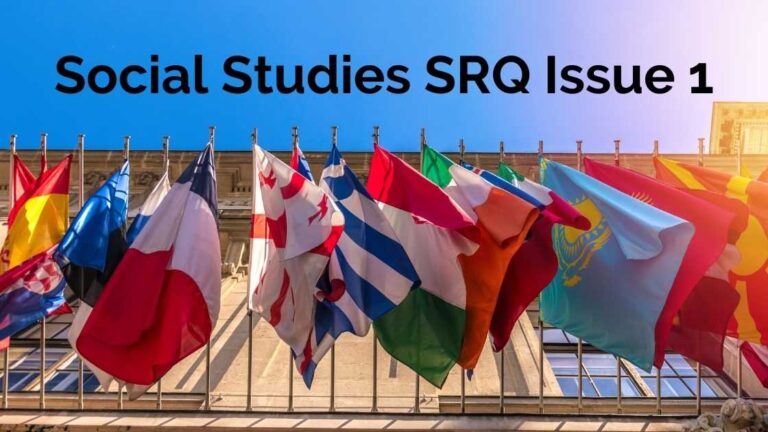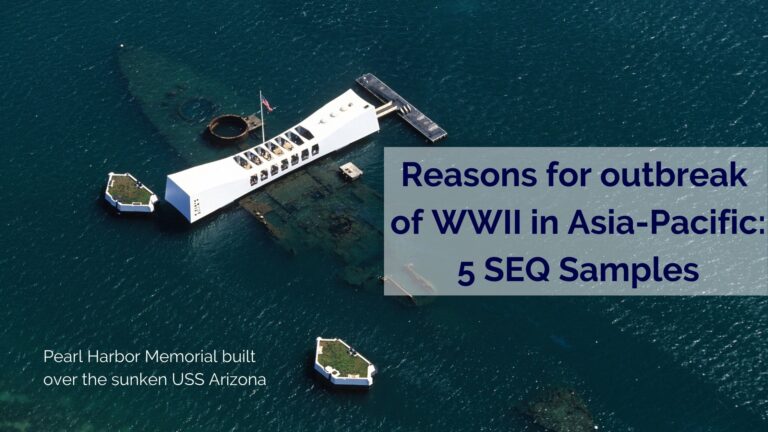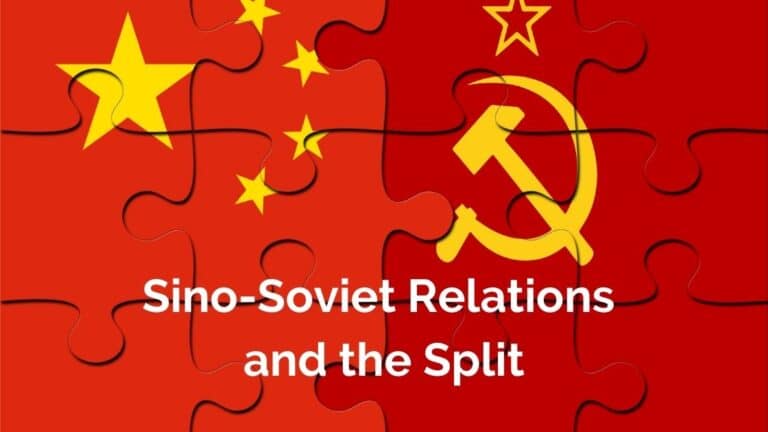League of Nations: 3 SEQ Samples
The O and N Level History SEQ typically centre on the reasons why the League of Nations failed and whether the League is a success or a failure. The questions on this topic are straightforward and thus easy to answer.
I have included three SEQ samples for O and N Level History students. You can download it below.
1. Explain two reasons why it was difficult for the League of Nations to achieve peace.
(P) It was difficult for the League of Nations to achieve peace because the various parts of the League did not work well together.
(E) The Secretariat was understaffed and disorganised. As a result, the Conference of Ambassadors often made decisions, which the League itself should have made. Additionally, the Allies did not explicitly define the relations between the Assembly and the Council. Furthermore, their competencies – with a few exceptions – were much the same.
(E) Both could deal with any matter bought up to League or affecting the peace in the world. They might pass the issue to each other since there were no clear directions and collaborations between the different groups in the League of Nations. Together with a lack of organisation in the Secretariat, the League was mostly dysfunctional.
(L) As a result, it wasn’t easy to enforce peace.
(P) Another reason why it was difficult for the League of Nations to achieve peace was due to the lack of membership.
(E) Despite its efforts on collective security, important countries like the USA, Germany and Russia were not part of the League of Nations. The USA did not want to be involved in other countries, Germany was forbidden to join the League of Nations as they were involved in the war and Russia was not invited.
Furthermore, any country that disagrees with the League could leave the League, and the League would not have any authority. For example, Japan and Italy left the League because they disagree with the League’s decision.
(E) Without the membership of influential countries, the League of Nations lacked authority and credibility to ensure world peace.
(L) Thus it was unable to enforce peace.
2. “The League of Nations was weak because of the absence of major powers.” How far do you agree with this statement? Explain your answer.
(P) Yes, I agree that the League of Nations was weak because it lacked authority and credibility due to the absence of important powers.
(E) The USA, which had proposed the organisation’s formation, did not join it. The USA was, at that time, the most powerful country in the world economically, politically, and militarily. Hence, the US absence weakened it.
Germany and the Soviet Union were also not allowed to join the League. They were significant powers, and their absence meant that the League lacked the economic and military backup of world powers to effectively enforce sanctions to stop aggressive nations or make other countries accept its decisions.
(E) For example, economic sanction against Italy during the Abyssinia crisis was not harsh due to fears that the USA would not support the boycott. Moreover, aggressive countries often ignored the League’s warnings as countries that could contribute to the League were not members. As a result, the League failed to prevent conflicts from escalating
(L) Hence, the weakness of the League of Nations was due to the absence of important nations.
(P) However, the League of Nations was also weak because of the post-war attitudes of the major powers.
(E) Its members were reluctant to achieve the objectives of the League. Members were also unwilling to contribute their army for the League’s use due to self-interest. Their reluctance was because of the economic problems they faced after WWI. Hence, contributing troops would strain their resources further. Thus, the League did not have sufficient military power to apply sanctions or deal with military threats from a powerful country.
(E) For example, in Italy’s invasion of Abyssinia in 1935, Britain and France were unwilling to use military force to stop Italy. Hence, aggressors like Italy were less willing to listen to the League as they knew they would not face any military confrontation. Instead, countries like Britain and France chose appeasement to appease aggressive leaders like Mussolini, which encouraged such leaders to continue their aggression. All these attitudes affected the League’s ability to pursue and enforce its aims and made it weak.
(J) In conclusion, the gap between what the League members were willing to do and its goals was too big for it to succeed. The members were too focused on their own nationalistic and domestic issues to make the league work.
However, the problem lies in the fact that the USA was absent from the League which she has created. Since the USA did not take the League seriously, the other members did not see the need to take it seriously. Consequently, the League would have been weak as the members held the mindset that the League was merely a platform for discussion than to take serious actions. Without the moral and military support of the US and the other stronger powers, the League found itself bypassed throughout the 1930s when managing aggressor nations.
Hence, the lack of membership, primarily its creator USA was the key underlying factor contributing to the other weaknesses of the League that led to it being unsuccessful.
3. “The League of Nations was a success.” How far do you agree? Explain your answer.
(P) I agree that the League of Nations was a success as it settled several disputes between small nations.
(E) The League successfully intervened to prevent a conflict between Finland and Sweden over state-owned the Aaland islands. As a result, Sweden accepted the League’s decision to give the islands to Finland but that the islanders should govern themselves.
The League also intervene successfully in the Greek-Bulgaria border dispute in 1925 when it got Greece to withdraw from the war and pay compensation to Bulgaria. In addition, the League was able to resolve the conflict between Yugoslavia and Albania in 1923 and made Yugoslavia withdraw from Albania.
(E) Thus, the League of Nations successfully maintained peace by settling international disputes through collective security.
(L) It was able to solve territorial conflicts between countries and uphold peace in these regions.
(P) I can’t entirely agree that the League of Nations was a success as it could not stop the aggression of stronger countries, especially in the 1930s.
(E) For example, the Manchurian Crisis. When Japan invaded Manchuria in 1931, no member of the League wanted to use sanctions against Japan. The Great Depression had already damaged trade between nations, and nobody tried to hurt it further by refusing to trade with Japan.
When the League decided to use persuasion on Japan, it took the League one year to investigate the crisis. By this time, Japan had secured Manchuria, and Japan ignored the League. Japan eventually left the League, and the League could not do anything as it did not have purview over non-members.
(E) The League of Nations was not a success as it failed to act decisively against aggressors like Japan.
(L) Thus the League was unable to ensure peace and stability in the region.
(J) In conclusion, I’m afraid I have to disagree that the League of Nations was a success as it failed miserably in fulfilling the main reason for its establishment, which was to maintain world peace. Although it managed to resolve the conflicts that involved the smaller countries, it could not stop the aggression of the more powerful nations, which eventually threw the world into the catastrophic World War 2.
Conclusion
This ends yet another part of my series on O Level and N Level History Elective. I hope you find this useful. If you want to read more about the League of Nations, click here.
You can also download a pdf version of this blog post below.
Other chapters are found below:
- Treaty of Versailles
- Rise of Stalin
- Stalin’s Rule
- Rise of Hitler
- Hitler’s Rule
- Reasons for World War II in Europe
- Reasons for the Defeat of Germany
- Reasons for World War II in Asia-Pacific
- Reasons for the Defeat of Japan
- Reasons for the Cold War
- Korean War
- Cuban Missile Crisis
- Reasons for the End of the Cold War

Critical Thought English & Humanities is your best resource for English, English Literature, Social Studies, Geography and History.
My experience, proven methodology and unique blend of technology will help your child ace their exams.
If you have any questions, please contact us!







